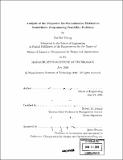Analysis of the Projective Re-Normalization method on semidefinite programming feasibility problems
Author(s)
Yeung, Sai Hei
DownloadFull printable version (3.688Mb)
Alternative title
Projective Re-Normalization method on semidefinite programming feasibility problems
Other Contributors
Massachusetts Institute of Technology. Computation for Design and Optimization Program.
Advisor
Robert M. Freund.
Terms of use
Metadata
Show full item recordAbstract
In this thesis, we study the Projective Re-Normalization method (PRM) for semidefinite programming feasibility problems. To compute a good normalizer for PRM, we propose and study the advantages and disadvantages of a Hit & Run random walk with Dikin ball dilation. We perform this procedure on an ill-conditioned two dimensional simplex to show the Dikin ball Hit & Run random walk mixes much faster than standard Hit & Run random walk. In the last part of this thesis, we conduct computational testing of the PRM on a set of problems from the SDPLIB [3] library derived from control theory and several univariate polynomial problems sum of squares (SOS) problems. Our results reveal that our PRM implementation is effective for problems of smaller dimensions but tends to be ineffective (or even detrimental) for problems of larger dimensions.
Description
Thesis (S.M.)--Massachusetts Institute of Technology, Computation for Design and Optimization Program, 2008. Includes bibliographical references (p. 75-76).
Date issued
2008Department
Massachusetts Institute of Technology. Computation for Design and Optimization ProgramPublisher
Massachusetts Institute of Technology
Keywords
Computation for Design and Optimization Program.